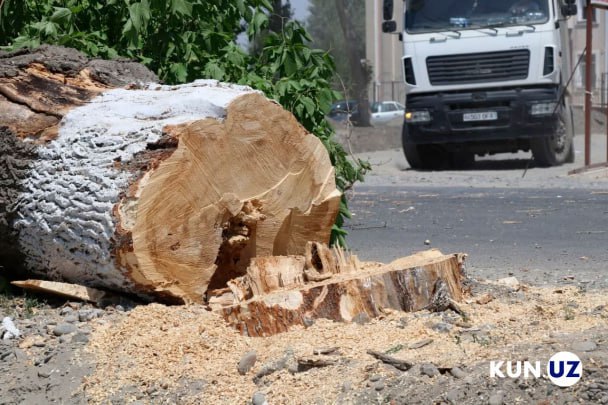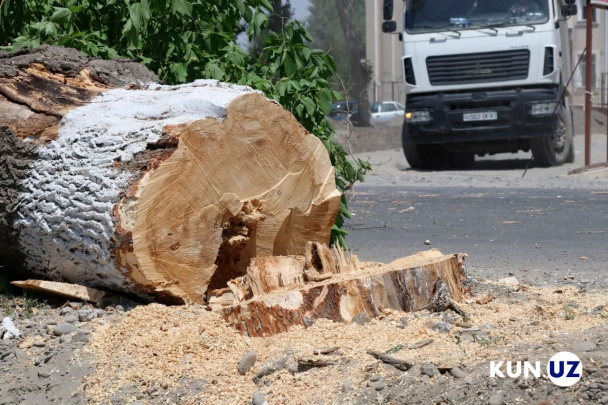Ecology Ministry slams entrepreneur Murod Nazarov’s proposal of legalizing tree-cutting, calls for protecting greenery
No sapling can replace the ecological functions of a mature tree for decades, Uzbekistan’s Ministry of Ecology, Environmental Protection and Climate Change stated in response to a recent proposal to create a “tree bank” as a compensatory mechanism for developers who cut down trees. The ministry criticized what it called the “cynical ingenuity” of some developers destroying trees and pledged to respond “symmetrically” to such threats.

Photo: KUN.UZ
The background
The ministry’s statement followed a proposal by developer Murod Nazarov, who recently argued during a meeting at the Chamber of Commerce and Industry that the current ban on tree felling is ineffective and only drives corruption. He noted that trees are often damaged by construction machinery and later cut down. As a solution, Nazarov proposed the legalization of tree removal through a mandatory compensation scheme – namely, the creation of a “tree bank.” This system, he said, could be used by developers and third parties to offset tree loss by planting new trees in advance.
The proposal reignited public debate over the role of green spaces in cities. Economist Botir Kobilov called for stronger protection of urban greenery due to its vital role in public health and environmental quality. Economist Bekhzod Khoshimov acknowledged the need for expanded housing construction in Tashkent and Uzbekistan but stressed the importance of transparency in urban planning and safeguarding green zones. Urbanist Iskandar Soliyev also highlighted the need for construction to follow a well-thought-out strategy that respects greenery and community interests.
Meanwhile, Javlon Abdullayev, an MP from the Ecological Party, called the idea of legalizing the felling of mature trees an environmental crime. He noted that in just six months, authorities had rejected 3,235 requests to cut down 453,000 trees. Bobur Bekmurodov, an MP from UzLiDeP and head of the “Yuksalish” movement, said the tree-felling moratorium “is not up for discussion.”
Alisher Kadirov, leader of the Milliy Tiklanish party, took a different stance. He argued that the moratorium should not mean an absolute ban and that cutting down trees should be allowed when necessary. “Yes, we need trees – we’re short on clean air – but let’s not forget: trees exist for people, not people for trees. If this continues, the next generation may forget their faith and begin worshipping trees,” he wrote.
The ministry's statement
The Ministry of Ecology emphasized that Uzbekistan is especially vulnerable to climate change, lacking access to seas and oceans – key natural sources of oxygen and carbon absorption – and with more than 60% of its territory covered by deserts or semi-deserts.
“Warming in Central Asia is happening at twice the global rate. Over the past 30 years, the regional temperature has risen by 1.5°C compared to the global average of 0.7°C. Under these conditions, green spaces become a vital part of the ecological balance, and the tree-felling moratorium aims precisely to preserve this balance,” the statement said.
Referring to international experience, the ministry noted that “strict tree protection measures are effective tools for environmental preservation and sustainable urban development.” It cited the following examples:
- Germany protects not only forests but also urban greenery. Illegal tree removal in public areas can carry fines of up to €50,000 per tree, and compensatory planting is strictly regulated.
- The United Kingdom imposes fines of up to £20,000 under a Tree Preservation Order (TPO), and possible imprisonment under Crown Court rulings. In 2023, the destruction of the iconic Sycamore Gap tree led to over four years in prison for the accused.
- Kazakhstan enforces criminal penalties for illegal tree felling, with fines up to $1,181 or up to 40 days of arrest, along with potential property confiscation.
- Russia applies criminal penalties of up to $12,770 or four years of imprisonment for large-scale tree felling, plus potential equipment confiscation and damage compensation.
- Uzbekistan, under its Administrative Liability Code, imposes fines ranging from $738 to $1,470 for individuals, and $1,470 to $2,210 for officials (amounts are calculated based on the Base Calculation Unit in the country).
The ministry insisted that the moratorium remains a key environmental safeguard. It rejected the tree bank idea on several grounds:
- A sapling cannot replace a mature tree in terms of carbon absorption, microclimate impact, or biodiversity. According to the European Environment Agency, a mature tree can absorb up to 21 kg of CO₂ per year – a capacity no sapling can match for decades.
- A tree bank system could enable speculative practices and corruption, contradicting the goals of national environmental policy. A Human Rights Watch report titled Wild Money highlighted how compensatory planting in some countries is used to cover up illegal tree felling. In Uzbekistan, such planting is a supplement, not a substitute for administrative or criminal liability.
The ministry further criticized some developers for using chemicals to deliberately kill trees so they can be legally cut down. This practice was cited as an example of “cynical ingenuity” aimed at circumventing ecological laws.
“It would be truly progressive if this level of creativity were used not to bypass environmental rules but to contribute to real ecological sustainability,” the ministry said.
Despite such tactics, the ministry stressed its commitment to respond proportionally to new threats and to prevent environmental violations.
“Revisiting the terms of the moratorium is especially disappointing at a time when many companies are working to adopt ESG (environmental, social, and governance) principles, and when 2025 has been declared the Year of Environmental Protection and the Green Economy in Uzbekistan,” the ministry added.
“Global experience shows that sustainable construction is built on preserving existing greenery – not on destroying it and planting replacements. The ministry is open to constructive dialogue but will not reconsider the fundamental principles of state environmental policy,” it concluded.
The statement also called for a review of the methods used by Murod Nazarov’s company in relation to tree removal.
Related News

19:11 / 18.07.2025
Developers urge interest-free access to escrow funds to avoid housing cost hikes

16:42 / 18.07.2025
Uzbekistan’s Ecological Party condemns entrepreneur Murod Nazarov’s proposal to lift tree-cutting ban

11:56 / 18.07.2025
Murod Nazarov calls for legalizing tree-cutting for developers, MP rejects proposal

13:16 / 16.07.2025



